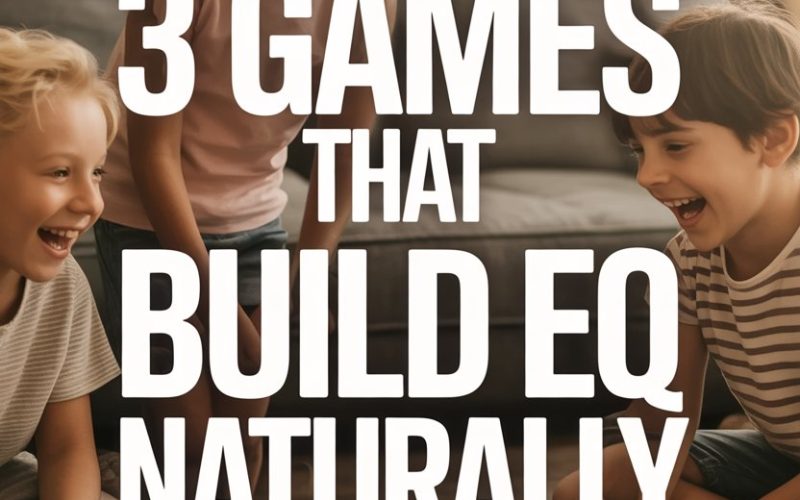Every parent wants to raise a child who’s clever, kind, and emotionally in-tune enough not to fling spaghetti at their sibling’s head when things get tough.
Emotional intelligence (EQ) isn’t just about catching feelings; it’s about reading them, managing them, and knowing what to do when your mate goes full Godzilla over a lost sock.
Now, if you’re picturing expensive therapy sessions or carrying a stack of parenting books everywhere—don’t.
EQ can grow right at home, through games sneaky enough to feel like fun and quick enough for even the most knackered parent to squeeze in before bedtime.
Here’s how three simple games can help your child grow emotionally, with barely any prep and a whole lot of heart.
1. Feelings Charades
Charades is a family classic, but why only mime “washing an elephant” or “pirate with a toothache” when you can act out emotions?
This version swaps movie titles for feelings, and suddenly, you’re raising a tiny Daniel Day-Lewis… but in touch with their inner world.
What You’ll Need
- Bits of paper
- Pens
- A hat, bowl, or that odd sock you still haven’t found the pair for
How to Play
Write down a bunch of emotions—excited, nervous, frustrated, proud, jealous, hopeful, relieved, etc.—one per slip. Mix them up and have each person draw a slip, then act out the feeling (no words, just facial expressions and body language). The rest of the family guesses.
If your household includes toddlers who’d rather eat the paper, stick to the basics: happy, sad, angry, scared, surprised.
Why It Works
Kids get to try on feelings in a safe space. Acting them out builds empathy—they start recognising what “jealous” or “nervous” might look like in themselves and others.
This isn’t just guesswork; researchers have shown that kids learn emotional vocabulary through play, which helps them regulate their own feelings.
Plus, nothing says “family bonding” like Dad pulling his best ‘devastated’ face just because he drew the wrong slip.
Extra Tips for Busy Nights
- Use picture cards for pre-readers.
- Limit rounds to 10 minutes—this isn’t the Oscars.
- Let your child add their own ideas; “giggly” or “grossed out” can be fascinating.
Charades like this helps everyone practise noticing and naming feelings. The fact that you’ll also laugh until someone snorts is just a bonus.
2. The Empathy Swap
Ever wish your child could see things from someone else’s point of view? “Imagine if you were your sibling and your LEGO castle was stomped on…”
This game makes that mental shift a fun challenge, and it’s perfect for those moments when arguments are brewing.
How It Works
Someone shares a recent story—or you, the resident referee, can supply one. Example: “Jamie felt upset when no one played with him at lunch.”
Each person then tries to put themselves in Jamie’s shoes and say how he might have felt, what he might’ve wanted, or what could help.
Take turns swapping roles: “What would you want if you were Jamie?” “What might you say if you were the friend?”
Kids love the chance to ‘act’ as someone else, and you’ll be amazed at the creative answers. (Warning: Prepare for random tangents—“If I were Jamie, I’d want a cake shaped like a dinosaur.” Not wrong, honestly.)
Backed by Science
Role-play like this actually boosts emotional intelligence. According to experts at Harvard, practicing perspective-taking helps children develop empathy and problem-solving skills in real life.
It’s not about having the “right” answer—it’s about thinking beyond their own experience.
Quick Adaptations
- Try this game during car rides—captive audience, less sibling wrestling.
- Use favourite book or film characters for stories.
- For older kids, introduce trickier scenarios (“What if your friend made a mistake and felt embarrassed at footy practice?”).
Empathy Swap is a crowd-pleaser for a reason. It turns everyday squabbles and sticky social moments into golden teaching opportunities—without anyone tuning out or wandering off.
3. Rose, Thorn, and Bud
Long day? This simple reflective game gives your child language to talk about big feelings, small annoyances, and what they’re looking forward to—all in a tidy three-part package.
How It Goes
Everyone shares:
- Rose: Something good from the day.
- Thorn: Something tricky or not-so-great.
- Bud: Something they’re excited or hopeful about.
It sounds simple, but it opens up rich conversations. Suddenly, you know your child didn’t just “do PE and maths” at school—they felt nervous in assembly, proud of their drawing, or a little worried about a friend.
And because you’re sharing too, it normalizes talking about the highs and lows.
What the Pros Say
Regular reflection builds self-awareness, optimism, and resilience.
SEL experts have found that these ‘naming and sharing’ rituals are a cornerstone of emotional intelligence. Kids learn it’s okay to feel all sorts of ways—and that grown-ups do too.
Easy Tweaks
- Keep it casual—on a walk, over tea, or during bathtime.
- For little ones, use simpler words: “something happy, something tricky, something fun tomorrow.”
- If your child is in a mood and says “nothing,” share your own Rose or Thorn first. Vulnerability is catching.
Rose, Thorn, and Bud won’t make every day perfect, but it gives your family a soft place to land and a habit of checking in—no emotional baggage required.
Growing EQ While You Juggle Everything
Between school runs, last-minute costume crises, and the endless hunt for matching socks, no one’s got time for elaborate parenting schemes.
That’s the beauty of these games—they fit right into real life, no extra kit or PhD in child psychology needed.
The real magic? These games go beyond teaching kids to “be nice.” They build self-awareness, empathy, and resilience—skills that last far longer than any spelling test or sticker chart.
Try one tonight. You might see a shy smile, a burst of honesty, or even a grudging apology between siblings.
And if what you get is a chorus of “Can we play again?”, well, that’s a win for everyone.
Who knew EQ could be this easy?





